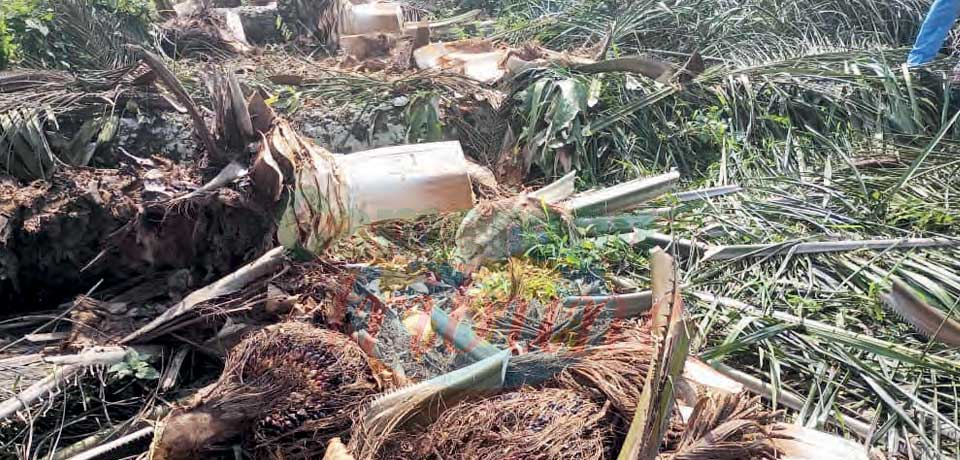Congo Basin : Conservation, While Logging Goes On - Unperturbed!
- Par Kimeng Hilton
- 29 Jun 2024 14:36
- 0 Likes
A new study sponsored by the World Wide Fund for Nature, WWF and published in the renowned science journal, Nature, shows that the conservation of large mammals is possible in Forest Stewardship Council, FSC-certified logging concessions.
The findings of the survey undertaken in Gabon and Congo Brazzaville by Dr Joeri A. Zwerts, an Associate Professor of Science, Biology, Environmental Biology, Ecology and Biodiversity from the University of Utrecht in The Netherlands, and other, were presented to stakeholders in the Cameroonian capital, Yaounde on Monday June 24, 2024. The study entitled “FSC-certified forest management benefits large mammals compared to non-FSC,” and published in the famous science journal, Nature in April 2024, was supported by the conservation organizations, the World Wide Fund for Nature, WWF and the Wildlife Conservation Society, WCS.
Conservation Is Possible In Logging Concessions
“The study shows that animals bigger than 10 kilogrammes are more abundant in Forest Stewardship Council, FSC-certified concessions. We know that logging entails the construction of roads in logging concessions, thereby promoting hunting. The wildlife in logging concessions where there is a lot hunting keeps reducing and cannot quickly recover. But in FSC-certified concessions in Gabon and Congo Brazzaville, wildlife is effectively protected, thus the abundance of large mammals in these concessions. People living in these logging camps are provided alternative sources of animal protein and some roads in the logging concessions are closed off to curb poaching,” Dr Zwerts told participants.
Findings Can Be Extrapolated
Adding, “Though the study was conducted in Gabon and Congo Brazzaville in seven Forest Stewardship Council, FSC-certified and seven non-certified logging concessions, we can safely extrapolate the findings to other tropical countries because of its regional character. These results very likely apply to Cameroon and other forests around the world and in the Amazon,” Dr Joeri noted.
Elephants Promote Carbon Sequestration
On the impact of the survey on carbon sequestration, he said forests without large mammals like elephants store less than 7 per cent less carbon sequestration because large mammals disperse large tree seeds and help in regenerating forests. “If we lose elephants, we lose the carbon and the forest does not regenerate fast,” he warned. “FSC certification requires more investments, but in the long run, it is still beneficial to logging companies, wildlife and the people who work in the logging companies. The results of the study can be used for better forest management in Cameroon because it has been demonstrated in the sub-region that FSC pays off,” the Dutch researcher said.
How Study Results Interest Cameroon
“The results of the study could encourage logging companies in Cameroon to get interested in FSC certification; as well as the government, donors and Non-governmental Organisations involved in the sustainable management of forests and the protected of communities living around such forests,” said Mrs. Wandja Mbianda Carmen Stephanie, Membership Manager, Forest Stewardship Council Africa.
FSC Certification, A Voluntary Process
According to her, forest certification is voluntary because it depends on the laws of the land of each country, though the process is costly. "Logging companies go in for certification for various reasons - the additional market value for their wood, good reputation, consumer demands, etc. Certification begins with commitment by a logging company which contacts a certification body, agreeing on the cost, the area to be certified, royalties to be paid to the local community and the small livelihood projects to be undertaken in and around FSC-certified concessions,” Wandja Mbianda explained further.
Dividends For All Stakeholders
Mbianda Carmen explained that Forest Stewardship Council Africa, FSC certification is a group of rules dealing amongst others with environmental and socio-economic issues and legality in logging and conservation. “The study carried out by Dr Joeri reveals that logging companies involved in certification respect norms such as better employee work conditions, respect of community rights and biodiversity conservation, improved management of resources from certified logging concessions, and the management of tree species in certified concessions and around them.”
H...
Cet article complet est réservé aux abonnés
Déjà abonné ? Identifiez-vous >
Accédez en illimité à Cameroon Tribune Digital à partir de 26250 FCFA
Je M'abonne1 minute suffit pour vous abonner à Cameroon Tribune Digital !
- Votre numéro spécial cameroon-tribune en version numérique
- Des encarts
- Des appels d'offres exclusives
- D'avant-première (accès 24h avant la publication)
- Des éditions consultables sur tous supports (smartphone, tablettes, PC)














Commentaires